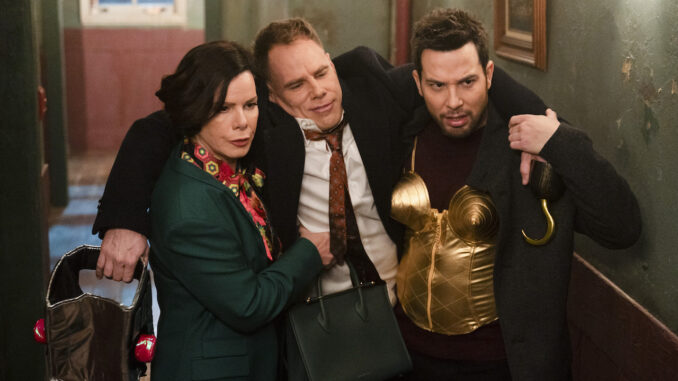
The Enduring Hum of the Familiar: When "So Help Me Todd" Defies the Stream
In a media landscape increasingly defined by the frantic churn of streaming releases, the digital cacophony of TikTok trends, and the pervasive, often gloomy, narrative surrounding traditional broadcast television, a quiet triumph is unfolding on CBS. "So Help Me Todd," a procedural dramedy centered around a quirky, recently disbarred private investigator and his buttoned-up attorney mother, has not merely held its own; it has achieved the seemingly impossible: hitting series high viewership for a second consecutive week. This isn't just a statistical blip; it's a vibrant illustration of the enduring power of character, comfort, and the collective ritual of appointment viewing in an atomized world.
The prevailing wisdom whispers that linear television is a relic, a dusty antique in the sleek, personalized metaverse of modern entertainment. Audiences, we're told, demand on-demand, binge-able content, curated by algorithms and devoid of commercial interruptions. Yet, against this pervasive narrative, "So Help Me Todd" has found its rhythm, attracting an ever-growing audience that opts out of the digital vortex, choosing instead the familiar hum of CBS on a Thursday night. This unprecedented consecutive growth is a powerful counter-narrative, suggesting that for all the allure of infinite choice, there remains a deep-seated human need for shared experiences, for shows that feel like a reliable friend, waiting for you at a set time.
What, then, is the alchemy behind this unexpected surge? It begins, undoubtedly, with the show itself. "So Help Me Todd" is not a prestige drama pushing the boundaries of storytelling or a dark, gritty exploration of the human condition. Instead, it offers an effervescent charm, a delightful blend of wit, warmth, and just enough procedural intrigue to keep the plot moving. The core of its appeal lies in the deliciously mismatched dynamic between Todd (Skylar Astin), the charmingly chaotic son, and Margaret (Marcia Gay Harden), the impeccably polished, subtly exasperated mother. Their banter is sharp, their love undeniable, and their personal and professional entanglements create a foundation that is both genuinely funny and deeply relatable. In an era often saturated with cynicism and despair, "So Help Me Todd" provides a refreshing dose of optimism, a balm for weary souls seeking escapism that doesn't demand emotional heavy lifting. It’s comfort food television, perfectly spiced and served with a knowing wink.
But the show's success isn't solely about its intrinsic qualities; it's also about its ecosystem. CBS, with its long-standing reputation for reliable, broadly appealing programming, has cultivated an audience that values consistency and character-driven narratives. This is the demographic that still enjoys the ritual of tuning in, that prefers a curated evening of entertainment over the endless scroll. The consecutive viewership highs for "So Help Me Todd" speak to a powerful word-of-mouth effect within this loyal base. Viewers are not just passively watching; they are actively recommending, drawing in friends and family who, perhaps, had grown weary of the digital deluge and longed for the simpler pleasure of a well-told story, delivered weekly. This organic growth is far more potent than any algorithmic suggestion, built on genuine connection and shared enjoyment.
In illustrating its growing viewership, "So Help Me Todd" becomes more than just a successful television show; it becomes a cultural barometer. It signals that the appetite for accessible, character-forward dramedies is far from sated. It reminds networks that investing in strong writing, compelling performances, and relatable human dynamics can still yield impressive returns, even in the shadow of streaming giants. For CBS, it’s a vital shot in the arm, affirming its strategy and perhaps even emboldening it to double down on the kind of programming that has always been its bread and butter: dependable, engaging, and genuinely enjoyable.
Ultimately, the story of "So Help Me Todd" hitting consecutive viewership highs is a hopeful one. It's a testament to the enduring human need for connection, laughter, and a little bit of comforting chaos. It proves that in a world fragmenting into infinite niches, there's still a place for the shared experience of television, for a show that invites us to sit down, relax, and enjoy the delightful dance of a mother and son navigating life's absurdities. So help us all, indeed, if television continues to find such charming ways to remind us of its simple, enduring power.
